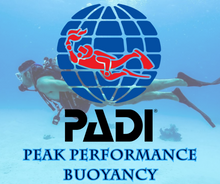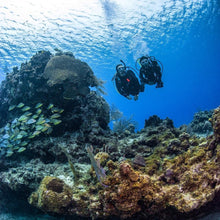Excellent buoyancy control is what defines skilled scuba divers. You’ve seen them underwater. They glide effortlessly, use less air and ascend, descend or hover almost as if by thought. They more easily observe aquatic life without disturbing their surroundings. You can achieve this, too. The PADI Peak Performance Buoyancy Specialty course improves the buoyancy skills you learned as a new diver and elevates them to the next level.
To enroll in this course you must be:
- A PADI (Junior) Open Water Diver (or similar from another diving agency)
- At least age 10 or older
Course Outline
During two dives, you’ll learn how to:
- Determine the exact weight you need, so you’re not too light or too heavy.
- Trim your weight system and scuba gear so you’re perfectly balanced in the water.
- Streamline to save energy, use air more efficiently and move more smoothly through the water.
- Hover effortlessly in any position – vertical or horizontal.
- Effectively swim underwater to consume less air.
Get credit:
The first dive of this PADI Specialty Diver course may credit as an Adventure Dive toward your Advanced Open Water Diver certification – ask your instructor about earning credit.
By completing this course you will also be one step closer to achieving the covenant title of Master Scuba Diver and joining the elite group of divers.
Equipment
It’s best to use your own scuba equipment, including a weight system, so that you fine-tune your buoyancy in gear you’ll use on every dive. Your Phoenix PADI Instructor can help you find the equipment that is best for you and your diving adventures.
Getting Started
As soon as you sign up (added the course to your cart and payment cleared) with Phoenix Divers to do your PADI Peak Performance Buoyancy Specialist Course, you will receive an email with the learning information you need.
You will get access to your PADI Peak Performance Buoyancy Manual and Peak Performance Buoyancy video.
Your Phoenix Divers PADI Instructor will contact you about scheduling time for practical in-water training.
- This course requires 2 - 3 days of practical assessment
- Normally over weekends but possible for during the week training








